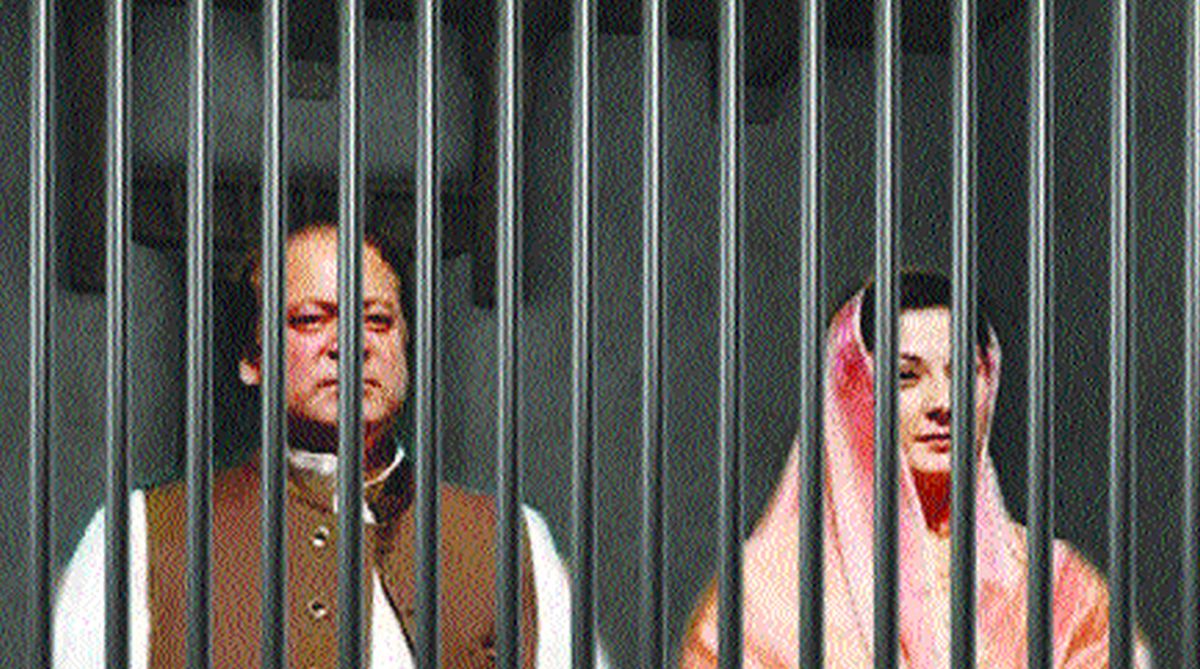As you read this, the results of a pre-cooked breakfast will have been reheated for your consumption. Eat it slowly. You have the next five years to digest it.
Some of you may not have the stomach to swallow something that has been masticated already. Others may not share those qualms. To them, even political swill is preferable to the prison food Nawaz Sharif has chosen for himself and his daughter Maryam.
During his first incarceration in Attock Fort at the hands of the military in 1999, Nawaz Sharif complained that he had not been given bottled mineral water. Twenty years later, in Adiala jail, he prefers no water at all, even (it is said) at the risk of damaging his kidneys.
Advertisement
His concern is understandably less with his own well-being than with that of his dying wife and his beloved daughter Maryam. She has decided to become another Benazir Bhutto, a second Aung San Suu Kyi — a woman tempered in the smithy of all-male brass-smiths. Nawaz Sharif is unlikely to contest the 2023 elections; Maryam Nawaz has every intention of doing so — with or without the blessings of her uncle Shahbaz Sharif.
For Shahbaz Sharif (always the chief minister, never the prime minister), this election could not have been a crueller test. He had two choices: the first, commit political suicide and share jail with Nawaz (as he did their exile to Saudi Arabia in 1999); the second, commit fratricide by distancing himself from Nawaz. The results this morning will reveal whether he took the right decision, or two wrong ones.
Former president Asif Ali Zardari has used these elections as a Montessori school, into which he admitted his callow son Bilawal for primary lessons in pavement politics. Like that other parent puppeteer Mrs Sonia Gandhi, Zardari jigs his son in public while retaining the strings of their jointly owned party in his own hands. The next step in Bilawal’s education will be a five-year course in the middle school of the National Assembly, followed by graduation to the prime ministership.
Imran Khan meanwhile has discovered that politics is a Test match played not over five days, but over five years. He entered the game with a straight bat. He has experienced being bowled out, run out, caught between the slips. That was enough for him realise that to win he needed a borrowed bat and a one-eyed umpire. Today, he will know whether he can add the PM’s Cup to his World Cup trophy.
Volumes will be written on the elections that should have ended on Wednesday night, but the battle is not over. Skirmishes will continue until 2023. Someone might even attempt a Pakistani version of Theodore White’s The Making of a President, that quadrennial account of every US presidential election held between 1960 and 1980. Pakistani authors, though, like Pakistani politicians prefer “to seize the day, seize the hour”. Mercurial history eludes their grasp.
For experienced politicians like Mrs Margaret Thatcher, history was as immediate as the moment itself. Surviving an IRA attempt to assassinate her in a Brighton hotel in October 1984, she summed up the failed finality in these words: “This was not the day I was meant to see.” This morning is the darkened dawn that, despite relentless attempts at character assassination, Nawaz Sharif was not meant to see.
For rational Pakistanis, the prospect of the next five years is enough to seek asylum in a country where buses run on time, not overhead; where electricity is a given, not an intermittent relief; where the supply of water is assured, not the boon of judicial obiter dicta; where the rupee does not float like some released birthday balloon; and where individual rights are not emasculated by strong-arm wrongs.
Could anything be more of concern to law-laden Pakistanis than to witness the Honourable Justice Shaukat Ali Siddiqui of the Islamabad High Court hurl allegations like pavement stones against ‘the premier state intelligence agency’? Or to read the tweet uploaded by the DG ISPR on a Sunday, asking the Honourable Supreme Court “to launch an inquiry to ascertain the veracity of the allegations levelled against state institutions”? Or to search for slivers of reassurance from the Honourable Chief Justice of the Supreme Court’s comment ‘that justice will be delivered’ to the complainant judge.
Some years ago, Jack Straw — Labour’s Home Secretary and later Foreign Secretary — once advised his party: ‘The question is not the rule of law, but which law should rule.’
Pakistan has no shortage of laws. It has godowns full of them. They have done little though to ward off famines of injustice. Will the new Parliament restore years ‘the locusts hath eaten’, or will it be just a fresh swarm of locusts?
Dawn/ANN.









